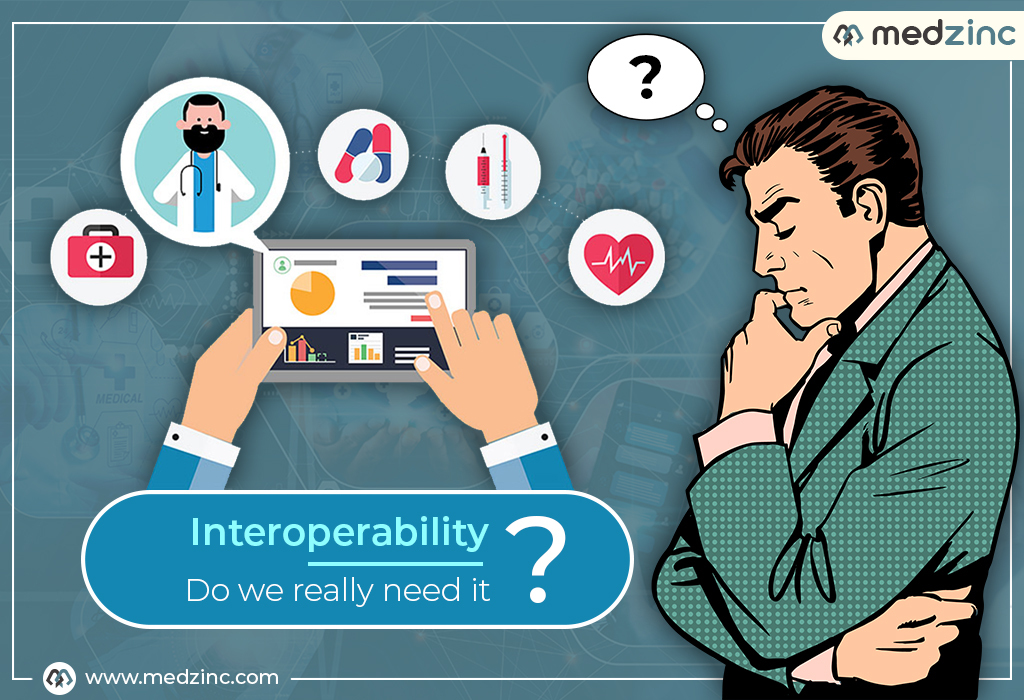
Interoperability in Healthcare Systems: Do we really need It?
The emergence of digital healthcare, health wearables and artificial intelligence has led to a new breed of digital health applications. One of the key topics that has come up as a result has been interoperability within the area of digital healthcare. The question arises as to whether a digital health system actually needs to be interoperable? The idea of interoperability is very important in most industries, but does interoperability even matter if it comes to healthcare? And this is what “medzinc” is here to clarify all the shadows of doubt. This blog will not only outline the importance of Interoperability in healthcare. But will also highlight the challenges associated with it and why it is the need of the hour for healthcare organisations.
What Is Interoperability in healthcare?
Interoperability in healthcare refers to the ability of different computers and devices to work together seamlessly. This includes the ability to exchange data and information between systems, as well as the ability to use that data and information to provide better care for patients. It is a key component of healthcare reform, as it can help reduce costs and improve care quality. In addition, interoperability can help to reduce medical errors, as well as improve communication between care providers. Some benefits of Interoperability in healthcare :
- Firstly, it Helps Safeguard Patient Data
- Secondly, it Assists Researchers Working for the Public Good
- Thirdly, it Improves Staff Productivity
- Moreover, it enables data exchange between systems.
- Lastly, offers Better Experience for Patients
- Lastly, enables Better care coordination
What Are The Challenges associated with Interoperability ?
Interoperability is the ability of different systems to work together. It is a key factor in the success of any organisation, particularly in the healthcare organisation. However, achieving interoperability is not without its challenges.
- One of the Prominent challenges is the lack of Standardisation. Different systems use different standards, which can make it difficult for them to communicate with each other.
- Another challenge is the need for data to be shared in a secure and private way. This can be a difficult balance to strike, particularly when data needs to be shared across different platforms.
- Another challenge is the need for all stakeholders to be on board with the interoperability initiatives. This includes getting buy-in from senior leadership, clinicians, IT staff, and patients. Without buy-in from all these groups , it can be difficult to implement interoperability successfully.
Despite these challenges, interoperability is essential for the success of any healthcare organisation. By overcoming these challenges, organisations can reap the many benefits that interoperability has to offer.
Why do we need interoperability in healthcare?
When it comes to healthcare, interoperability is the Key. That’s because interoperability allows different systems and devices to work together. This is important because it helps to ensure that everyone involved in patient’s care has the information they need to provide the best possible care. There are a number of reasons why interoperability is so important in healthcare.
- Firstly, it helps to improve patient safety. As when different systems are able to work together, it’s easier to identify potential problems and make sure that patients get the care they need.
- Secondly, interoperability can help improve quality of care. When everyone involved in a patient’s care has access to the same information, it’s easier to coordinate care and make sure that everyone is on the same page.
- Finally, interoperability can help to reduce costs. When different systems are able to work together, it’s easier to avoid duplicate tests and procedures, and that can lead to savings for the healthcare systems as a whole.
In short, interoperability is essential to the healthcare system. It helps to improve patient safety, quality of care, and efficiency, and that benefits everyone involved.
Related Post
No results.